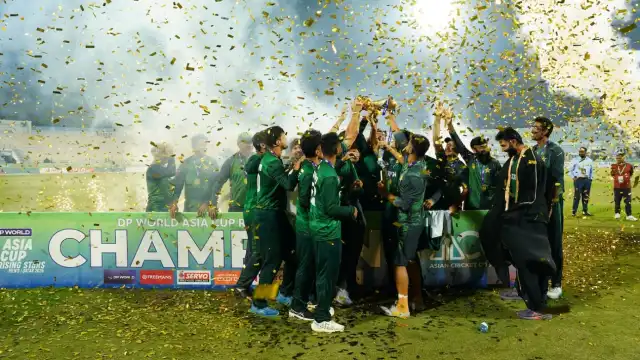The Pakistan Cricket Board (PCB) has announced a major financial reward for the Pakistan Shaheens after their title-winning run at the Asia Cup Rising Stars tournament. According to former Pakistan captain Salman Butt, PCB Chairman Mohsin Naqvi has approved a cash prize of 50 lakh rupees for each of the fifteen players in the victorious squad.
The announcement has been widely seen as a powerful endorsement of Pakistan’s emerging cricket talent. Throughout the tournament, the Shaheens displayed maturity, discipline, and composure under pressure—qualities often associated with far more experienced sides.
Led by Irfan Khan, the team remained undefeated from start to finish. Their campaign included a standout group-stage victory against India, a result that immediately turned heads and raised expectations. However, their biggest test came in the final against Bangladesh A, where the title was decided in dramatic fashion through a Super Over. The Shaheens held their nerve when it mattered most, eventually clinching the trophy and underlining the depth of talent in Pakistan’s cricketing pipeline.
The decision by Mohsin Naqvi to reward every player with a substantial cash bonus marks a significant shift in how Pakistan treats its developmental squads. Traditionally, large financial rewards and public recognition have been reserved primarily for the senior national team, particularly after major tournament victories. By extending such a generous incentive to the Shaheens, the PCB is sending a clear message: performances at the emerging level are valued and will be rewarded.
This move also carries symbolic weight for Naqvi’s tenure as PCB chairman. The Asia Cup Rising Stars trophy is the first major title Pakistan has secured under his leadership, and acknowledging the achievement in this way reinforces his stated commitment to investing in the country’s cricketing future.
For the young players, the reward is about more than just financial gain. It serves as validation that their hard work, discipline, and performances on the field are being closely watched at the highest levels of administration. It also reinforces the idea that there is a real pathway from developmental squads to full international honours, backed by institutional support rather than just verbal promises.
The Shaheens’ success and the PCB’s response highlight a broader shift towards long-term planning and bench-strength development in Pakistan cricket. If this approach continues—prioritizing youth, rewarding effort, and investing in the next generation—Pakistan’s future on the international stage could be defined by a deeper, more confident, and more competitive squad.
